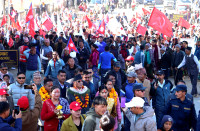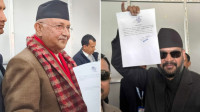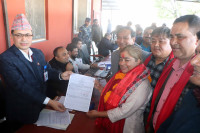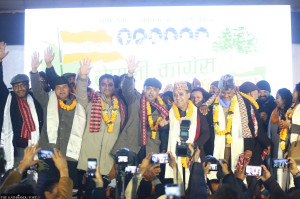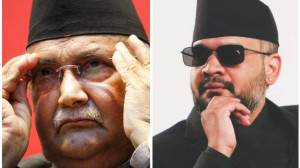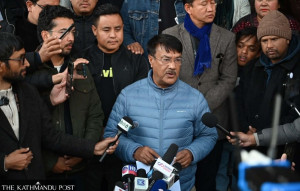Politics
Prasai confined to his Thimi house, supporters detained
He had no prior permission for demonstration, police say.
Binod Ghimire
The government on Friday stopped the ‘Campaign to protect nation, nationalism, religion, culture and citizens’, led by controversial businessman Durga Prasai, from organising and protesting in Kathmandu, arguing that it didn’t have the permit to do so.
After holding a demonstration in the Balkhu area on Thursday, the Prasai-led group announced that it would hold continuous protests around the Tinkune area starting Friday. However, the District Administration Office, Kathmandu said the group didn’t have a permit to protest in a public place. It warned of legal actions against any protests staged without permission.
“This is to inform that certain areas will be allotted for protests if the organiser, after coordination with the security agencies, seeks permission to stage peaceful protests," read a statement issued by Rabindra Prasad Acharya, assistant chief district officer in Kathmandu.
For their Thursday’s demonstrations, the local administration had allocated Balkhu for Prasai's organisation and the Tinkune area for the CPN-UML’s youth wing National Youth Federation Nepal.
With Prasai vowing to continue his protests despite the administration’s warning, a large number of security personnel were mobilised across the Kathmandu Valley to prevent the protests. On Friday morning, a police contingent reached Prasai’s residence at Thimi at Bhaktapur and prevented him from coming out throughout the day.
Police resorted to indiscriminate arrests of suspected protesters. Some common people passing through the Tinkune area too were detained on suspicion of being protesters. “We rounded up over 210 protesters who violated the restrictions imposed by the district administration office,” Superintendent of Police Kumud Dhungel, spokesperson for the District Police Range Kathmandu, told the Post. “We are screening the detainees to decide whom to release and whom not.”
The police denied having arrested passersby.
Holding a press meet later in the day at his home, Prasai said the government put him under house arrest to stop him from raising his voice for the poor. “I don't fear arrest. I am even ready to sacrifice my life in the fight for the poor’s welfare,” he said, accusing the government of violating the right to peaceful protest.
A habeas corpus writ petition was lodged at the Supreme Court on Friday claiming the government had unconstitutionally placed Prasai under house arrest.
The Bhaktapur administration, however, refuted his claim of house arrest. Roshani Kumari Shrestha, the chief district officer in Bhaktapur, said Prasai was free to hold protests with permission from the administration.
“We are only obstructing his defiance of the prohibitory orders,” she told the Post. “On Thursday, we escorted him to Balkhu, a place designated for him to protest. We would have happily escorted him to the protest venue today [Friday] had he taken permission,” she told the Post. “The government respects the right to peaceful protests.”
Prior permission is a must to stage any kind of demonstration or gathering, as per the Local Administration Act. Starting this year, Prasai has been resorting to different forms of protest which he says will overthrow the present system of governance to reinstate monarchy and Nepal as a Hindu state.
Following Friday’s restriction, Prasai has appealed to his supporters across the country to start demonstrations in all 77 districts starting Saturday. Issuing a statement, the campaign condemned the government for preventing the protest and claimed that excessive force was used against the protesters on Thursday.
It claimed that fearing protests, the government arrested hundreds of campaigners including Shahi Yuwa Sangh convenor Pashupati Khadka on Friday. “Such suppression and brutality sow the seeds of new revolutions. The brutality has only strengthened our campaign,” reads the statement. “In retaliation for police oppression, we appeal to one and all to start protests in all 77 districts.”




 16.12°C Kathmandu
16.12°C Kathmandu
